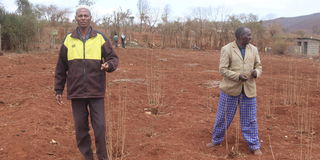Marsabit miraa farmers uproot their crop as drought ravages the region

Molu Kanchora (right) and Abduba Dalacha showing a miraa farm with only dried sticks at Qilta Qoma area remaining on March 14, 2023. Miraa farms in Marsabit have been adversely affected by the ongoing drought.
Somel miraa farmers in the mountainous areas of Marsabit have been forced to cut down or uproot their crop after the plants drastically wilted due to the ravaging drought.
Qilta Qoma Location resident Abdub Dalacha is among the farmers in Marsabit Central who have taken the drastic step.
“We have been forced to cut down or uproot our miraa to save us from continually bearing the pain of seeing them dry up and we can’t do anything about it,” Mr Dalacha said.
He explained that the decision was reached by the farmers to either cut down their miraa plants, leaving only the stumps in the hope that they will sprout again in the event there will be adequate rains.
However, some other farmers have decided to completely uproot their miraa plants, having lost all hope that the only cash crop in the region will recover from the worsening adverse impacts of climate change.
He said that the drying up of the crop was a big blow to farmers who wholly relied on the economic activity as their mainstay, thus leaving them at the mercy of humanitarian agencies for relief food aid.
Women who sold miraa in Marsabit have had to close shop due to dwindling supply.
However, the few determined traders have resorted to selling miraa from Meru County.
Similar lamentations were echoed by Mr Molu Kanchora, who said miraa farming in the region was no longer rewarding.
He said in past bountiful seasons, farmers would sell a kilo of miraa at Sh150.
Now that all the miraa plants in Saku sub-county have dried up, the traders have to wait for miraa imports to Marsabit, which sell for Sh300 a kilo.
Marsabit County Woman Rep Naomi Wako also decried the level of vulnerability the ongoing drought had caused among the residents.
She was concerned that even Saku sub-county which used to produce enough crops such as maize, beans, peas, bananas, mangos, and oranges, among others, was no longer productive due to the five seasons of failed rains witnessed in the region.

Qilta Qoma Location resident Abdub Dalacha showing the remaining wilting miraa plants in his half-acre farm on March 14, 2023. A number of farmers in the region opted to uproot their crops due to drought.
She called on collaborative efforts from government agencies and other stakeholders to begin promoting irrigation farming in the areas with arable land across the county.
She is happy that the national government already has plans to build dams across the country and hoped that such projects would help alleviate continual food insecurity witnessed in Marsabit county.
The MP further called on all partners to promote climate change adaptation approaches that would see the region emerge victorious from the adverse weather events in the region.
“It is high time we embraced climate change adaptation approaches as it is obvious that climate change is here to stay,” Ms Wako said.





